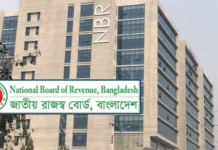
Eleven banks faced a capital shortfall of Tk 24,783 crore in the first quarter of 2021, which highlighted the fragile health of the lenders.
The banks are Bangladesh Krishi Bank, Sonali, Agrani, ICB Islamic, Rajshahi Krishi Unnayan, BASIC, Bangladesh Commerce, Rupali, Janata, Padma, and AB Bank.
 For all latest news, follow The Daily Star’s Google News channel.
For all latest news, follow The Daily Star’s Google News channel.
Corruptions perpetrated at the banks are mainly responsible for the large capital shortfall.
Bangladesh Krishi Bank had the highest capital shortfall of Tk 11,229 crore as of March, up 4 per cent from three months ago, data from the Bangladesh Bank showed.
Sonali’s capital shortfall widened to Tk 3,697 crore from Tk 3,063 crore during the period.
“The central bank should take immediate measures to address the problem as such a situation sends a negative message to the international community and local businesspeople that the banking sector is weakening,” said an official of the central bank.
Foreign businesses usually look at the capital base and non-performing loans of banks before making any investment decisions, he said.
“This type of capital shortfall will put foreign investors at bay,” the central banker said.
However, the banking sector had a surplus capital of Tk 16,562 crore in March, up from Tk 15,930 crore three months ago.
Between January and March, the capital position at Janata Bank improved significantly because of a regulatory forbearance extended by the central bank. The regulator’s move would help the state-run bank keep the provision against unclassified and defaulted loans in phases.
A regulatory forbearance is a policy that permits financial institutions to continue operating even when their capital is fully depleted.
Despite getting the forbearance, Janata’s capital shortfall stood at Tk 417 crore in March in contrast to Tk 5,475 crore three months ago.
Janata Bank Managing Director Md Abdus Salam Azad said the bank now enjoyed a capital surplus of Tk 6,017 crore as it managed another regulatory forbearance last month.
The central bank allowed the bank to keep the required capital in phases in the next four years.
“This has helped us make a net profit of Tk 14.45 crore last year,” Azad said. The capital shortfall of BASIC Bank stood at Tk 1,072 crore in March, down 28.15 per cent a quarter ago.
Md Anisur Rahman, managing director of BASIC Bank, said the bank had been faced net losses in recent years that were responsible for the capital shortfall.
“We are trying to recover defaulted loans, and this will help us narrow the shortfall.”
In addition, the bank is seeking deposits from various government agencies at a lower interest rate.
As much as 90 per cent of the defaulted loans, which were disbursed between 2009 and 2013, are uncollectible, said an official of the bank.
At least Tk 4,500 crore was swindled out of the bank, and a number of senior officials and board members, including then BASIC Bank Chairman Sheikh Abdul Hye Bacchu were allegedly involved.
Between 2009 and 2013, the bank also mobilised long-term deposits at a higher interest rate. The deposits have now become a burden for the bank and are one of the main reasons for the capital shortfall.
If BASIC Bank can get the low-cost deposits from the government agencies, it will help the lender manage the balance sheet smoothly and make a profit, the official said.
In March, the average capital adequacy ratio, a measurement of a bank’s available capital expressed as a percentage of risk-weighted credit exposures, stood at 11.67 per cent in the banking sector, down from 11.64 per cent three months earlier.
This means the overall capital base strengthened in the first quarter of 2021.









